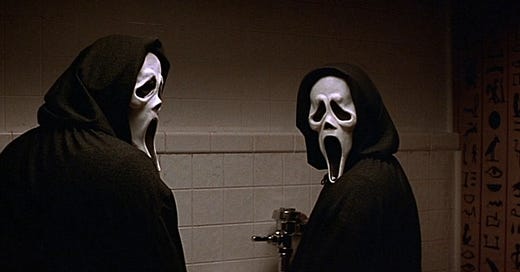Spooky Halloween edition! A Horror cliche comes to life
Horror movies often have powerful authority figures who remain neutral in the face of terrors. Is it possible there are parallels to this in real life? Lol, yes. Read this anyhow!
A quick note: I’m still running my promotion to get new subscribers. For each new member of Brands Mean a Lot between now and November 10th, I’ll be donating $5 to The Doe Fund. If you think they’d enjoy reading this, tell your loved ones, friends and family alike.
Neutrality nightmares
In 1984’s ‘A Nightmare on Elm Street’, Freddy Krueger, a scar-covered, claw-clad villain, haunts the dreams of a group of teenagers. In ‘Nightmare’, Krueger enters the teens’ dreams, haunting and killing them in a variety of gruesome practical-effects masterpieces. It falls to the protagonist and focus of Krueger’s bloodlust, Nancy, to defeat him.
Horror movie tropes abound in the film: teen coitus, victims running up stairs instead of down, a vengeful spirit from the past, and what will be this week’s focus, authority figures remaining neutral in the face of crisis.
As Krueger navigates various dreamscapes massacring her friends, Nancy makes multiple appeals to her parents—one of which is a cop—to help her. Both parents refuse to engage at all. They’re not alone: the bystanding gets so bad that at the climax of the movie, Nancy’s trapped in her own home as she’s chased by Krueger. She pleas for help with an officer across the street who ignores her. It’s only after several attempts that the officer decides to help; however, help comes too late, and Krueger absconds with Nancy’s mom to someplace that seems much worse than wherever she was prior.

Pictured: Freddie and Nancy. Are they gonna smooch?
Although Nancy survives, the movie ends with Krueger still on the loose. Would things have been different if those in power had come to Nancy’s side?
CEOs: scared, stupid
With a polarizing election approaching, several CEOs have felt the need to straddle the fence in a public manner. On October 22nd, Rob Rhinehart, co-founder of Soylent, a company that makes nutrient drinks for people who find eating inconvenient, announced in an essay that’s 5,000 words too long that he’d be voting Kanye West for president. Rationale that tiptoes between earnest and stupid is sprinkled throughout:
I know, in my heart, that Kanye West, while he is not perfect, is the best person to lead America. Even if Kanye West was not running for president, I would vote for him. Unlike the impostors, he is destined to lead.
Given Kanye’s political wherewithal, it’s hard to interpret Rhinehart’s vote as anything but a joke or a waste of a vote. In any case, his vote won’t do anything for any party hoping to improve things—Republican, Democrat, or otherwise.

Pictured: A shepherd with his flock
Similarly, Brian Armstrong, the CEO of digital currency exchange Coinbase, wrote an also-too-long post, the thrust of which is that Coinbase should strive to avoid engaging with broader social issues. Coinbase’s mission is to create “an open financial system for the world.”
The horrors of value-chain malfeasance
If you’re able to spot the irony in a currency exchange CEO believing it’s possible to create an open financial system for the world and simultaneously abstain from social issues, congrats, you’re not as much of a doofus as Brian Armstrong.
As part of a value chain, a company is subject to labor laws, taxes, environmental regulation, and a mess of other stuff that touches politics. Labor laws determine things like the minimum wage, taxes pay for social goods like disease prevention, and the environment includes the air, which oxygenates everyone’s blood.
How a company creates and markets its products is therefore its intrinsic stance on those same issues. Chipotle’s subpar food-safety and sick leave policies fostered an environment where a couple of years ago, some of its restaurants were ground-zero for the spread of foodborne illness to over 1,000 people. Were employees not so afraid of having their pay docked for being out sick, they’d have gone home instead of remaining on the job and spreading a stomach bug. Therefore company leaders have enormous influence over these sorts of social decisions.

Frightening fence-sitting
Much like Freddy, business leaders’ attempted neutrality when it comes to social issues is the stuff of nightmares. Any attempt at abstention is an admission that what happens next doesn’t matter. Just one leader is bad on their own, but pooled together, that’s a lot of power that’s not interested in making anything better.
This raises a final possibility: some authority figures believe the status quo is fine. This makes them a sociopath. This is well within the realm of possibility, and certainly cause for that same classic horror-gore revulsion feeling we get when we see someone’s intestines splayed onscreen.
In horror movies, authority’s neutrality leaves the protagonist to thwart spirits and psychos alone. Power itself is the ability to marshal resources and raise awareness amongst others in power—each of these advantages helps solve a crisis, whatever it may look like. What if Nancy’s father the cop had listened, or enlisted the entire police force to help? Imagine keeping the movies scary, but life less so.
🔪🔪If you liked it, share with your friends
👍👍 Had a taste and want more (once a week)?
Song of the week: We’re heading into the election. Let’s hope this is our bottom. With that in mind, here’s Howard Jones’ “Things can only get better”




